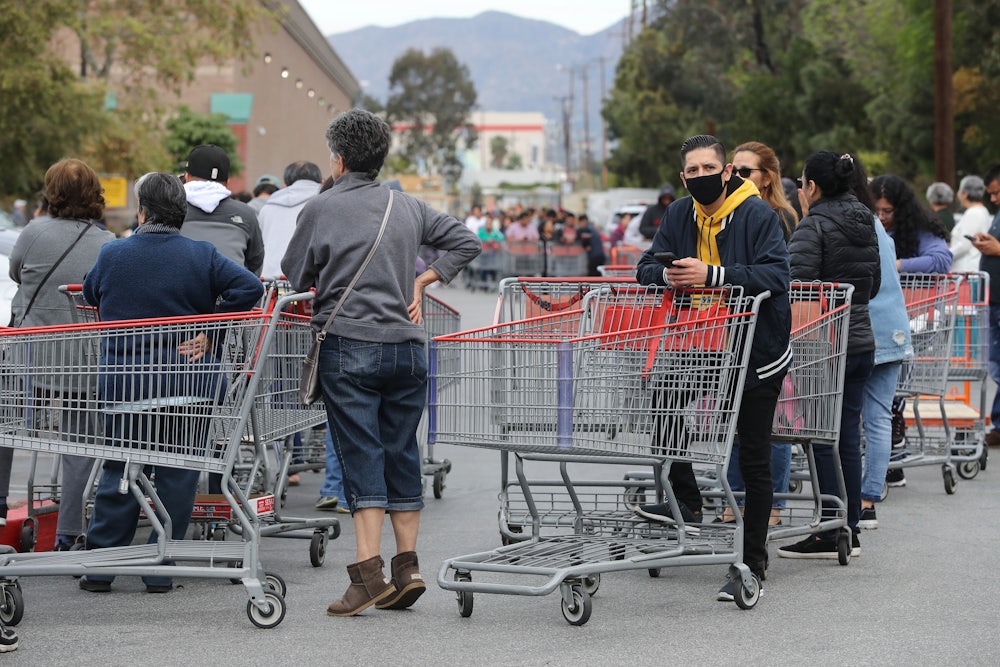In Detroit earlier this week, city officials announced a moratorium on new water shutoffs. They are also returning service to customers behind on their bills, and locking in water fees at $25 a month for the duration of the current public health crisis. In New York State, Governor Andrew Cuomo and state lawmakers are working on a paid sick leave policy that would compensate quarantined employees for their missed time at work. In San Diego, the state’s Health and Human Services Agency set up handwashing stations to serve the homeless population around the county. In Miami-Dade County, all evictions were indefinitely suspended.
The coronavirus crisis, in this way, has been clarifying about what people need to survive, pandemic or not: clean water, paid time off, equal access to housing, safe public accommodations. The problem is that we need this kind of stuff year-round, and these policies will likely disappear when, or if, the threat of Covid-19 subsides.
America infamously has no federal paid sick leave policy, which makes quarantining or any kind of preventative caution financially difficult—if not entirely impossible—for more than 32 million workers in this country. A 2016 Gallup poll also found that roughly 57 percent of American workers do not have the ability to work from home, which presents a real problem when it comes to social distancing, a preventative measure that could help flatten the curve of community spread. And for those who can practice social distancing, there exists the parallel problem of businesses taking a financial hit due to lost foot traffic or other disruptions in supply. For those whose work is event-based or requires in-person labor, layoffs have often been the immediate response for a number of companies. While states like Washington have begun to implement programs that allow companies to temporarily cut back on staffing while providing those employees unemployment benefits, the issue speaks to the lack of an across-the-board policy.
Referring to the policy gap on paid time off, Representative Ilhan Omar tweeted recently that, “Outbreak or not—paid sick leave should be guaranteed in this country.” Looking to act on this, last week in Congress, Senator Patty Murray and Representative Rosa DeLauro co-introduced the Paid Sick Days for Public Health Emergencies and Personal Family Care Act, which would require employers to grant workers seven days of paid sick days and then make an additional 14 days available during a public health emergency. Similarly, Senator Elizabeth Warren has backed a stimulus package that would include funding for small and midsize businesses to specifically be used to prevent layoffs and hour cuts. A new paid sick leave policy and the funding to go with it would allow full-time salaried workers to stay home during these emergencies. Now imagine this as a general policy, without a massive public health threat in place. Small businesses sometimes face slow periods—anyone who has experienced a dip in business or hours following a holiday rush can understand this well enough. People get sick even when not facing a pandemic.
There are similar efforts in place right now for gig workers. At the grassroots level, organizations in Seattle like Working Washington, whose campaigns predate the domestic coronavirus outbreak, have doubled down on their efforts to seek a higher minimum wage for workers at companies like DoorDash and Grubhub. Higher wages will allow workers to have a slightly bigger cushion in case of emergency, though the better outcome remains unionization and full-time status.
Working Washington has also called for a moratorium on evictions and the preservation of health care benefits, as part of a holistic program to prevent people losing housing or access to basic medical care if they’re between paychecks for a while. These calls were echoed by Representative Alexandria Ocasio-Cortez on Thursday, when she proposed a pause on both mortgage and student loan payments. In this same vein, Representative Deb Haaland and a group of Democrats introduced a bill on Wednesday aimed at shoring up food security in the wake of the crisis disrupting shipping routes, adding in her press release that regardless of whether there’s a crisis, “No family should have to worry about getting food because they’re sick and can’t go to work.”
And then there’s the elephant that looms over nearly all of this: the fact that we lack the single-most-influential and mainstream policy that could have prepared the nation for this outbreak—a universal health care system. You don’t have to look far to find an anecdote of the runaround the current system creates. America’s testing rollout has been notably dreadful, compounded by the fact the tests and subsequent treatment are affordable only to those with insurance or wealth. For everyone else, there is no primary care physician to call, and the decision to go seek testing and treatment becomes a question of affordability. With a third of Americans reporting that they skipped out on medical care in the past 12 months due to high costs, the hole-riddled system Americans are left to contend with is undoubtedly contributing to the spread of the virus.
In a decent country, one that valued people beyond what their annual income is, we would already have policies like these in place. They are the basement floor of a good life. Still, it has taken a global pandemic for elected officials to press for immediate change and not just eventual fixes at the margins. The system was broken before the coronavirus arrived; it’s just that now the vulnerability has been spread around to those who used to be able to look away.
